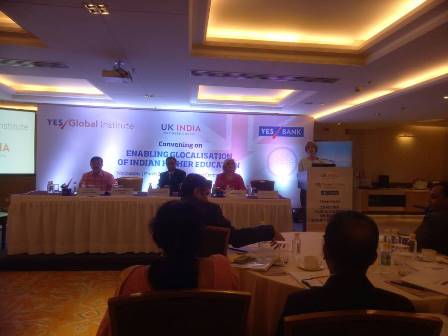YES Institute, the practicing think tank under the aegis of YES BANK in collaboration with the UK India Business Council, conducted a half day convening on ‘Enabling glocalisation of Indian higher education’ on March 29, 2017. The event witnessed participation from a broad range of stakeholders from the academia, civil society organizations, government, research institutions etc. The stage for the event was set by Ms. Preeti Sinha, Senior President and Global Convenor, YES Global institute, wherein she outlined that the potential of Indian higher education becoming a global talent hub, is huge. However, the sector faces challenges by way of being under-resourced, increasing global competitiveness etc. Rt. Hon. Patricia Hewitt, Chair, UKIBC & Distinguished fellow, YES Global Institute delivered the theme address as she re-iterated UK’s commitment towards viewing India as a trusted partner, be it in education , sciences, R&D etc. She also emphasized the importance of ‘innovative pedagogies’ in education such as ‘blended modes of learning’, specially in light of companies today, being desperate for talent which is ‘glocal’ . Delivering the special address at the convening was Prof Seyed E Hasnain, VC, Jamia Hamdard University, who said that ‘the current times offer a huge potential for Higher Education, and we need to think ‘differently & disruptively’ for making use of this opportunity.
Dr Arvind Panagariya, Vice-chairman, NITI Aayog delivered the key note address and shed light on the ‘regulatory barriers’ that constrict higher education today. He said that for fully realizing the opportunities that lay before us in the higher education today, we need to do away from such ‘layers of regulation’, and seek facilitative autonomy at all levels, such as financial, administrative, etc. He cited the examples of couple of universities from China, which the government funded on a large scale, and which resulted in the universities being top ranked currently. He also called for the sector to think more ambitiously and reach out to the global institutions for collaboration. Dr Mahendra Nath Pandey, Minister of State for Human Resources Development, was the chief guest at the event, and while delivering the inaugural lecture, recounted the various governmental policies for revamping higher education in the country, such as the upcoming new education policy (centered around equity, equality, access, accountability & affordability), GIAN scheme, Policy on establishment of world class universities, knowledge e-portal etc. He also said that the government was aiming at increasing the spending on ‘education’ from the current 1.2% to about 4.5% of the GDP in the coming years.

The second half of the event witnessed a panel discussion on ‘Evolving scenario of Indian Higher Education: Opportunities for Global Collaboration’. The speakers included Dr Kavita Sharma, President, South Asian University; Dr Vidya Yeravdekar, Principal Director, Symbiosis Education Society; Prof B S Satyanarayana, VC BML Munjal University and Mr Aditya Malkani, Country head-India, King’s College London. The session was moderated by Prof M M Ansari, Advisor, YES Global Institute & former member, UGC. The deliberations centered around increasing the outreach and visibility of Indian Higher Education in Global Circles through increased competitiveness, state-of-art infrastructure, and ways in which India can transform into a ‘potential knowledge hub’ for the future. This was followed by an open discussion session.The event also witnessed the release of the Yes Global Institute-UKIBC Report on ‘De-mystifying Indian Higher Education Ecosystem’.




